A manometer reads the pressure of a gas in an enclosure as shown in figure (a) When a pump removes some of the gas , the manometer reads as in figure (b). The liquid used in the manometers is mercury and the atmospheric pressure is 76 cm of mercury.
(a) Give the absolute and gauge pressure of the gas in the enclosure for cases (a) and (b) , in units of cm of mercury.
(b) How would the levels change in case (b) if 13.6 cm of water (immiscible with mercury) are poured into the right limb of the manometer ? (Ignore the small change in the volume of the gas).
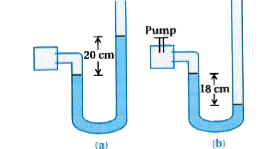 Solution in Gujrati
Solution in Gujrati
Absolute pressure =96cm of Hg. Gauge pressure =20 cm of Hg for (a) absolute pressure =58 cm of Hg gauge pressure=-18 cm for Hg
Topper's Solved these Questions
- BOOK - NCERT GUJARATICHAPTER - MECHANICAL PROPERTIES OF FLUIDS EXERCISE - EXERCISE31videos
MECHANICAL PROPERTIES OF FLUIDS
- BOOK - NCERT GUJARATICHAPTER - LAW OF MOTIONEXERCISE - EXERCISE (ADDITIONAL EXERCISE)17videos
LAW OF MOTION
- BOOK - NCERT GUJARATICHAPTER - MECHANICAL PROPERTIES OF SOLIDS EXERCISE - Exercises16videos
MECHANICAL PROPERTIES OF SOLIDS
Similar Questions
Explain why
The angle of contact of mercury with glass is obtuse. While that of water with glass is acute .04:15View SolutionFigure shows the position-time graph of a body of mass 0.04 kg. Suggest a suitable physical context for this motion. What is the time between two consecutive impulses received by the body ? What is the magnitude of each impulse ?
 04:08View Solution
04:08View SolutionA steet wire of length 4.7 m and cross - sectional area 3.0×10−5m2 stretches by the same amount as a copper wire of length 3.5 m and cross- sectional area of 4.0×10−5m2 under a given load. What is the ratio of the Young's modulus of steel to that of copper ?
01:47View SolutionA manometer reads the pressure of a gas in a enclosure as shown in figure(a) When some of the gas is removed by a pump, the manometer reads as in (b). The liquid used in the manometers is mercury and the atmospheric pressure is 76 cm of mercury. (i) Give the absolute and gauge pressure of the gas in the enclosure for cases (a) and (b) in units of cm of mercury . (ii) How would the level change in case (b) if 13.6 cm of water are poured into the right limb of the manometer?
08:24View SolutionA manometer reads the pressure of a gas in an encloure as shown in fig. when some of the gas is removed by the pump, the manometer reads as in fig. the liquid used in mano-meters is mercury and the atmospheric pressure is 76 cm of mercury.
(i) Given the absolute and gauge pressure of the gas in the two cases (in units of cm. of mercury).
(ii) How would the levels change in case(b) if 13.6cm of water are poured into the right limb of manometer? (Ignore the change in volume of the gas).
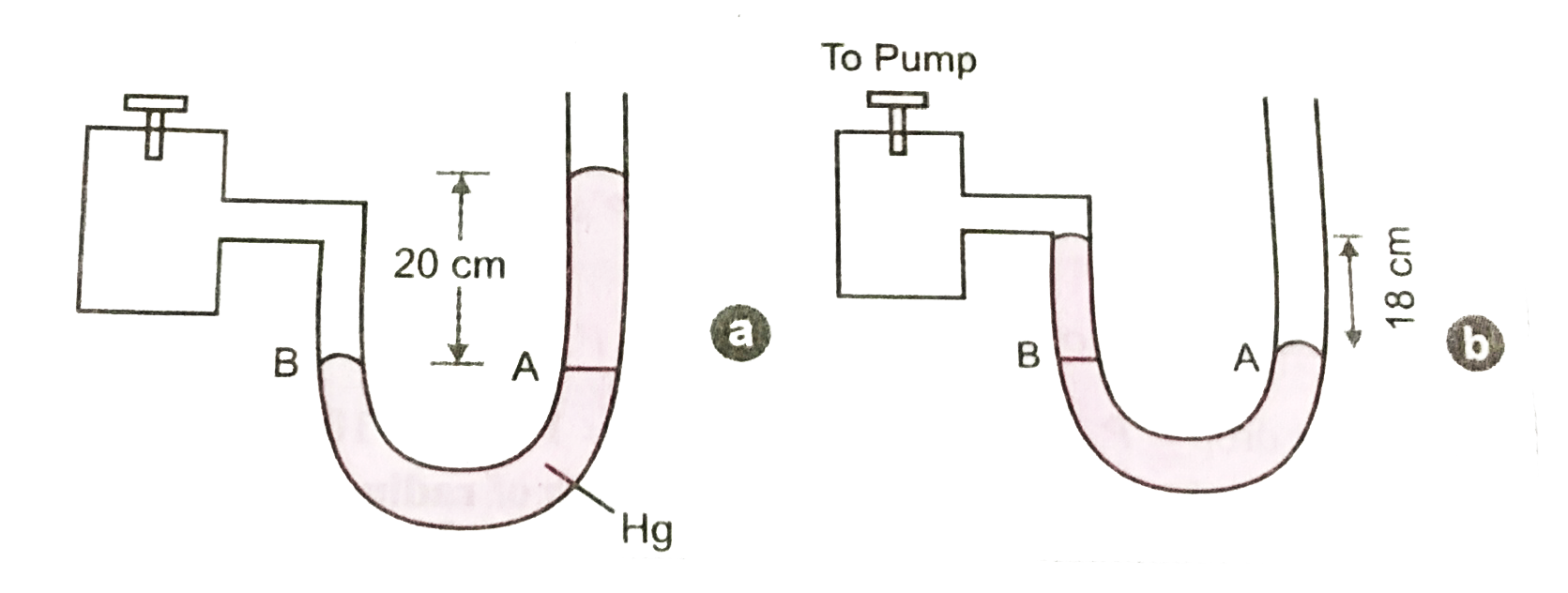 View Solution
View SolutionA manometer reads the pressure of a gas in an enclosure as shown in the figure. The absolute and gauge pressure of the gas in cm of mercury is (take atmospheric pressure =76 cm of mercury)
View Solutionचित्र (a) में दर्शाए अनुसार कोई मैनोमीटर किसी बर्तन में भरी गैस के दाब का पाठ्यांक लेता है। पंप द्वारा कुछ गैस बाहर निकालने के पश्चात मैनोमीटर चित्र (b) में दर्शाए अनुसार पाठ्यांक लेता है। मैनोमीटर में पारा भरा है तथा वायुमंडलीय दाब का मान 76 cm (Hg) है।
(i) प्रकरणो (a) तथा (b) में बर्तन में भरी गैस के निरपेक्ष दाब तथा प्रमापी दाब cm (Hg) के मात्रक में लिखिए।
(ii) यदि मैनोमीटर की दाहिनी भुजा में 13.6 cm ऊँचाई तक जल (पारे के साथ अमिश्रणीय ) उड़ेल दिया जाए तो प्रकरण (b) में स्तर में क्या परिवर्तन होगा? (गैस के आयतन में हुए थोड़े परिवर्तन की उपेक्षा कीजिए। )
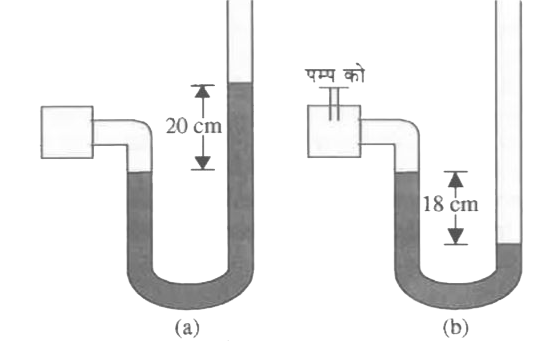 08:24View Solution
08:24View Solutionचित्र (a) में दर्शाए अनुसार कोई मैनोमीटर किसी बर्तन में भरी गैस के दाब का पाठ्यांक लेता है | पंप द्वारा कुछ गैस बाहर निकालने के पश्चात मैनोमीटर चित्र (b ) में दर्शाए अनुसार पाठ्यांक लेता है | मैनोमीटर में पारा भरा है तथा वायुमंडलीय दाब का मान76 cm (Hg) है |
प्रकरणों(a) तथा (b) में बर्तन में भरी गैस के निरपेक्ष दाब तथा प्रमापी दाब cm(Hg) के मात्रक में लिखिए |View Solutionचित्र (a) में दर्शाए अनुसार कोई मैनोमीटर किसी बर्तन में भरी गैस के दाब का पाठ्यांक लेता है | पंप द्वारा कुछ गैस बाहर निकालने के पश्चात मैनोमीटर चित्र (b ) में दर्शाए अनुसार पाठ्यांक लेता है | मैनोमीटर में पारा भरा है तथा वायुमंडलीय दाब का मान76 cm (Hg) है |
यदि मैनोमीटर की दाहिनी भुजा में 13.6 cm ऊँचाई तक जल ( पारे के साथ अमिश्रणीय ) उड़ेल दिया जाए तो प्र करण (b) के स्तर में क्या परिवर्तन होगा ? (गैस के आयतन में हुए थोड़े परिवर्तन की उपेक्षा कीजिए |)View Solutionचित्र (a) में दर्शाए अनुसार कोई मैनोमीटर किसी बर्तन में भरी गैस के दाब का पाठ्यांक लेता है। पंप द्वारा कुछ गैस बाहर निकालने के पश्चात मैनोमीटर चित्र (b) में दर्शाए अनुसार पाठ्यांक लेता है। मैनोमीटर में पारा भरा है तथा वायुमंडलीय दाब का मान 76 cm (Hg) है।
(i) प्रकरणो (a) तथा (b) में बर्तन में भरी गैस के निरपेक्ष दाब तथा प्रमापी दाब cm (Hg) के मात्रक में लिखिए।
(ii) यदि मैनोमीटर की दाहिनी भुजा में 13.6 cm ऊँचाई तक जल (पारे के साथ अमिश्रणीय ) उड़ेल दिया जाए तो प्रकरण (b) में स्तर में क्या परिवर्तन होगा? (गैस के आयतन में हुए थोड़े परिवर्तन की उपेक्षा कीजिए। )
 07:56View Solution
07:56View SolutionA manometer reads the pressure of a gas in an exclosure as shown in fig.10.25(a) When a pump removes some of the gas, the manometer reads as in fig.10.25(b) the liquid used in the manometer is mercury and the atmospheric pressure is 76cm of mercury.
Give the absolute and gauge pressure of the gas in the exclosure for cases (a) and (b) in units of cm of mercury.
How would the levels change in case (b) If 13.6 cm of water (immiscible with mercury) are poured into the right limb of the manometer? (ignore the small change in the volume of the gas).
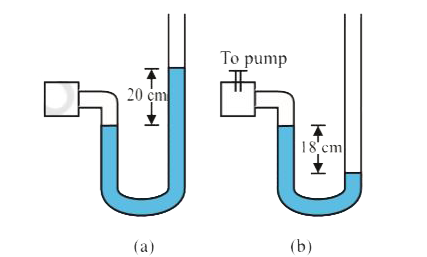 05:30View Solution
05:30View SolutionA manometer reads the pressure of a gas in an exclosure as shown in fig.10.25(a) When a pump removes some of the gas, the manometer reads as in fig.10.25(b) the liquid used in the manometer is mercury and the atmospheric pressure is 76cm of mercury. Give the absolute and gauge pressure of the gas in the exclosure for cases (a) and (b) in units of cm of mercury. How would the levels change in case (b) If 13.6 cm of water (immiscible with mercury) are poured into the right limb of the manometer? (ignore the small change in the volume of the gas).
05:01View SolutionA manometer reads the pressure of a gas in an exclosure as shown in fig.10.25(a) When a pump removes some of the gas, the manometer reads as in fig.10.25(b) the liquid used in the manometer is mercury and the atmospheric pressure is 76cm of mercury.
Give the absolute and gauge pressure of the gas in the exclosure for cases (a) and (b) in units of cm of mercury.
How would the levels change in case (b) If 13.6 cm of water (immiscible with mercury) are poured into the right limb of the manometer? (ignore the small change in the volume of the gas).
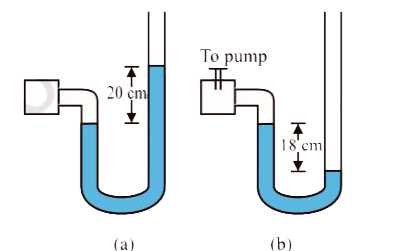 View Solution
View SolutionA manometer reads the pressure of a gas in a enclosure as shown in figure(a) When some of the gas is removed by a pump, the manometer reads as in (b). The liquid used in the manometers is mercury and the atmospheric pressure is 76 cm of mercury. (i) Give the absolute and gauge pressure of the gas in the enclosure for cases (a) and (b) in units of cm of mercury . (ii) How would the level change in case (b) if 13.6 cm of water are poured into the right limb of the manometer?
04:58View SolutionA manometer reads the pressure of a gas in an enclosure as shown in figure (a) When a pump removes some of the gas , the manometer reads as in figure (b). The liquid used in the manometers is mercury and the atmospheric pressure is 76 cm of mercury.
(a) Give the absolute and gauge pressure of the gas in the enclosure for cases (a) and (b) , in units of cm of mercury.
(b) How would the levels change in case (b) if 13.6 cm of water (immiscible with mercury) are poured into the right limb of the manometer ? (Ignore the small change in the volume of the gas).
 05:39View Solution
05:39View Solution

